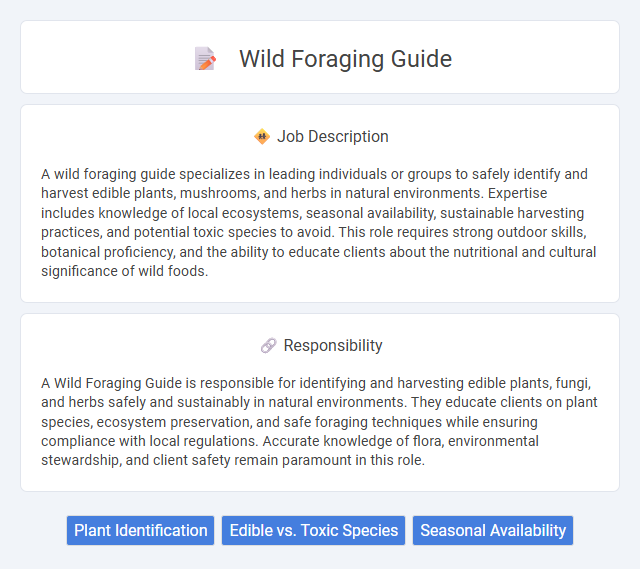
A wild foraging guide specializes in leading individuals or groups to safely identify and harvest edible plants, mushrooms, and herbs in natural environments. Expertise includes knowledge of local ecosystems, seasonal availability, sustainable harvesting practices, and potential toxic species to avoid. This role requires strong outdoor skills, botanical proficiency, and the ability to educate clients about the nutritional and cultural significance of wild foods.
Individuals with a keen interest in nature and a strong sense of adventure are more likely to excel as wild foraging guides. Those who possess good physical stamina and an ability to identify edible plants could find this role particularly suitable. People with allergies to plants or limited outdoor endurance may face challenges in this job.
Qualification
A Wild Foraging Guide must possess extensive knowledge of local flora, including edible and poisonous plants, fungi, and herbs, to ensure safe and informative experiences. Certification in wild plant identification, first aid, and wilderness safety is highly valued, alongside practical experience in outdoor education or environmental science. Strong communication skills and a passion for nature conservation are essential for leading engaging and responsible foraging excursions.
Responsibility
A Wild Foraging Guide is responsible for identifying and harvesting edible plants, fungi, and herbs safely and sustainably in natural environments. They educate clients on plant species, ecosystem preservation, and safe foraging techniques while ensuring compliance with local regulations. Accurate knowledge of flora, environmental stewardship, and client safety remain paramount in this role.
Benefit
Wild foraging guide jobs likely offer opportunities to connect closely with nature while teaching others about sustainable harvesting techniques. This role probably enhances personal knowledge of edible plants and mushrooms, potentially improving health and self-sufficiency. There may also be a chance to generate income through eco-tourism or educational workshops, appealing to those passionate about conservation and outdoor adventure.
Challenge
Wild foraging guide roles likely present significant physical and environmental challenges, requiring extensive knowledge of local ecosystems and plant identification. Navigating unpredictable weather conditions and ensuring safety while harvesting edible and medicinal plants may be demanding aspects of the job. The role probably demands resilience, adaptability, and strong problem-solving skills to manage potential risks in remote or rugged terrain.
Career Advancement
A Wild Foraging Guide career offers extensive opportunities for advancement through certification in botany, ecology, and wilderness survival, enhancing credibility and expertise. Professionals can expand their roles into educational workshops, environmental consulting, and content creation, increasing income potential and industry influence. Networking with conservation organizations and participating in sustainability initiatives further positions guides for leadership roles and specialization in exotic or medicinal plant foraging.
Key Terms
Plant Identification
Expertise in plant identification is essential for a wild foraging guide, ensuring safe and sustainable harvesting from diverse ecosystems. Recognizing edible, medicinal, and toxic species requires in-depth botanical knowledge and practical experience in various habitats. Proficiency in this skill aids in educating clients, promoting environmental stewardship, and supporting foraging ethics.
Edible vs. Toxic Species
A wild foraging guide expertly identifies edible versus toxic species, ensuring safe and sustainable harvesting practices. Detailed knowledge of plant morphology, habitat, and seasonal changes enables accurate differentiation between nutritious wild foods and harmful look-alikes. This expertise minimizes risks of poisoning while promoting awareness of biodiversity and responsible foraging ethics.
Seasonal Availability
Wild foraging guides require extensive knowledge of seasonal availability to identify edible plants and fungi at their peak growth periods. Understanding regional climate patterns and plant phenology ensures safe and sustainable harvests throughout spring, summer, and autumn. Expertise in seasonal cycles maximizes foraging success while preserving natural ecosystems and promoting biodiversity.
 kuljobs.com
kuljobs.com